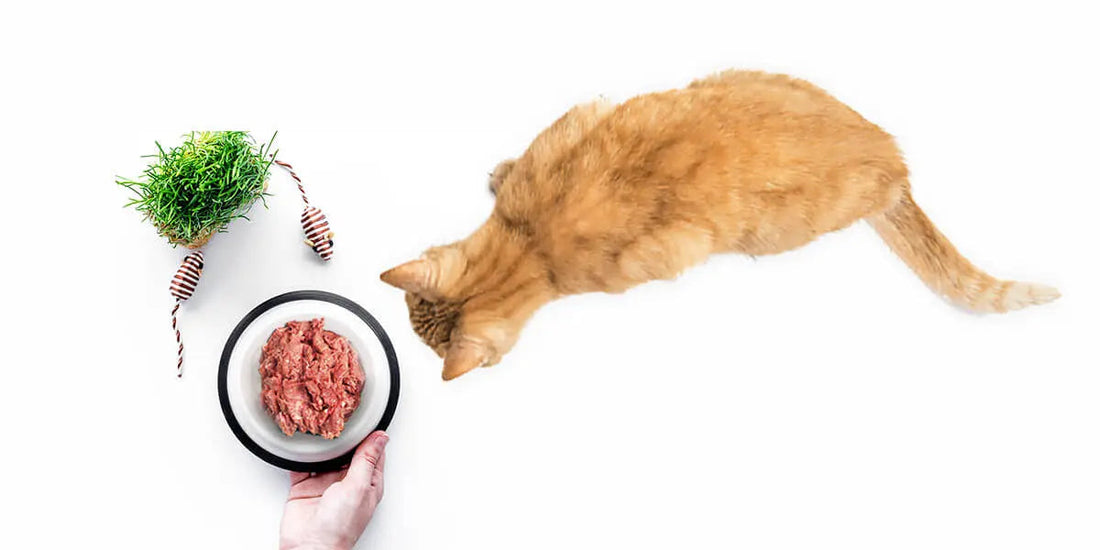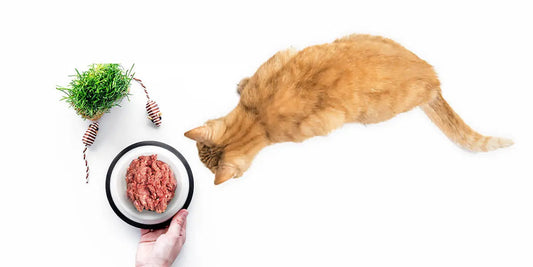
Complete Transition Guide for Cats
Written by Darwin's
Congrats on making the healthiest choice for your pet by switching them to a fully raw, grain-free diet. We’ve put together a complete guide to help you transition from conventional cat food to your new fresh, raw meals.
Start Slow
While your cat may want to gobble up his new raw food on day one, it’s important to take things slow to prevent any digestion issues. We recommend a 10-day transition as outlined in the Quick Start Guide that comes with each customer’s first Darwin’s order and can also be found in our Transition Center.
In that guide, we recommend starting your transition by mixing 25 percent Darwin’s with 75 percent of the conventional diet your cat was previously used to. Do this for the first three days. Then on day 4, add a higher percentage of Darwin’s. We recommend feeding 50 percent Darwin’s and 50 percent conventional cat food for days 4 through 6. Then, from day 7 to day 9, you’ll want to increase that percentage again so that you’re feeding 75 percent Darwin’s. Finally, on day 10, you’ll be feeding 100 percent Darwin’s Natural Pet Products.
Now, this guide is what works for most pets. However, each cat is unique and may take more time to ease into his new routine. Cats can be finicky and will choose to go without food at all than eat food they aren’t comfortable with. Go at your pet’s own pace, and feel free to reach out if you have any questions.
Maintain a Feeding Schedule
If you’ve free-fed your cat in the past, transitioning won’t just mean switching foods. It will also mean creating and maintaining a new feeding schedule.
A consistent feeding schedule is recommended for two reasons. First, training your cat to expect food at certain times of the day will build up his appetite and help deter begging throughout the day. Second, raw meals of any kind can only be left out at room temperature for 20 minutes at a time; so it’s important your cat is ready and excited for his mealtime to prevent food waste.
The simplest way to create a new feeding schedule is to line it up with breakfast and dinner, feeding your pet once in the morning and once again in the evening.
Finicky Felines, Kittens, and Seniors
Picky eaters, kittens, and seniors all go hand-in-hand when transitioning to a raw diet. They all need a little special care during the switch. But don’t worry; these steps are simple.
- Eliminate treats in between meal times. Instead, use healthy bribe foods like bonito flakes or sardines during meal times.
- Serve your pet’s meals in a “safe” area of your kitchen away from foot traffic. Cats also often enjoy eating high up, away from other pets and people.
- Try hand-feeding a small amount of Darwin’s. The scent of your hand will be comforting and may ease any anxiety your cat has for trying something new. Always remember to wash your hands after handling any raw meat.
- Gently cook Darwin’s meals to release the flavors and aromas. This is also a recommended safety step for senior cats, kittens under 4 months old, and any other cat with a compromised immune system. We recommend lightly sautéing in a pan over medium to medium-high heat for 8-12 minutes.
- Use a flat food dish so you don’t irritate your cat’s sensitive whiskers. He may refuse food if his whiskers rub against the walls of his food dish.
- If your cat was a kibble-eater, try transitioning to a cooked wet food first to get them acclimated to the texture of raw. This could be a conventional canned wet food or you can gently cook Darwin’s as detailed above.
How to Create a Feeding Schedule


